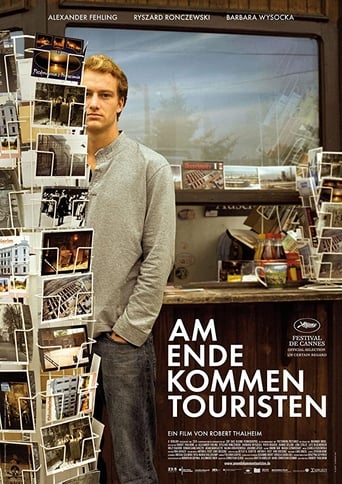

A young conscientious objector from Germany -- back in the days when there was still compulsive national service-- serves his term in Oscwiescim running errands for a holocaust survivor, and falls in love with a local girl who wants to escape the mediocrity of the Polish boondocks. This movie is well shot and acted, but the plot is too predictable. Of course, the old guy is grumpy (and not really a great humanitarian who welcomes the idealistic lad), and the young couple grapples with a bit of anti-German sentiment. That's what I expected from the opening credits, and that's what this movie delivers. The fact that the male and female leads are a bit too toothsome detracts from the plausibility of the romance and adds to the predictability of the plot.
... View MoreThis film reduces the dramatic form to its most minimal state. It is exactly the opposite to 'Schindlers List'. The difference seems to be, that on one side you have the dramatic (re)construction of historical events with a clear message (bad and good are clearly divided; a hero stands up against state authority (Schindler) to save human lives etc.). 'Am Ende kommen Touristen' on the other side reflects on the problem, that 'in real life' it's much more difficult to learn something out of the past. Moralistic reflections and statements - be it in movies or in real life - about the past have turned into repetitive, self-righteous clichés, that have lost their meaning and their authenticity: What does it mean to say 'Something like that should never happen again'? What political actions (war for human rights etc.) can be justified with past experiences? Why putting up an memorial on a site, where once so many innocent people were killed, when on the other side the present has changed so fast, that the past has lost its meaning? In a way the films message is nihilistic: there is no answer to the question of how the past relates to the present. There can be no lesson drawn from the past - rather the world has become too complex to be fully understood. (And the science of history on the other hand has to solve the problem of relating the past to the present; of persuading the reader that the past is somehow still relevant to the present). Though the film seems rather nihilistic in its political meaning it gives a rich insight in the often painful and desperate efforts of human beings, who try to deal with those problems of the modern world and who try to find explanations of some kind. And after all the film gives hope in so far as in the end the protagonist returns to the memorial center: therefore he is not just escaping from a hyper-complex world, but tries to face it even though he hasn't found any definitive answers and can only listen wordlessly to the standardised reflections about the past of the teacher, who talks to him in the bus.The formal style of the film underlines this enigmatic absence of meaning very successfully: minimal use of music; a very subtle dramatization (e.g.: the story is not about life or death); an open end - all this reminds of the sophisticated style of Eric Rohmer. Certainly one of the best German films of the decade...
... View MoreSven, a young German (Alexander Fehling), electing to do civilian work for his national service and hoping to be sent to Amsterdam, is sent, without any preparation, to Oswiecim (Auschwitz), where he is to act as the helper of an octogenarian Polish former inmate (Ryszard Ronczewski), who has chosen to go on living on the camp site, repairing disintegrating suitcases for the exhibition there and occasionally speaking as a witness to tourists.The young man is gradually sensitized to the situation; the old man, crusty and unfriendly towards the young German, hardly changes in his attitude. Both performances were quite magnificent.The ordinary citizens of today's Oswiecim are reminded when they are asked where they come from that they live in a place whose name is associated with infamy; but otherwise they live very normal lives, and there seems to be no incongruity in the fact that the young people of Oswiecim dance the nights away in bars and pop venues just as young people do in other places. Some, like the young woman who becomes Sven's girl friend (Barbara Wysocka), who are good linguists, make a living out of conducting guided tours through the camp.I think it is an ALMOST perfect film, sensitive, bringing out the relationship between the two main characters, with straightforward and ungimmicky filming. But, without forgetting that there were many non-Jewish Poles who also suffered in Auschwitz, it is all the same somewhat astonishing that Jews are nowhere mentioned in the film. The old man presumably was not Jewish; as a Polish inmate he had been given the job by the Nazis to collect the suitcases from the new arrivals. Repairing the suitcases for the exhibition is his mission in life. The only indication of the Holocaust is the fact that one can read the Jewish names on the suitcases.
... View MoreThis film has no clichés, which is amazing considering its subject has had a thousand examinations ,but never from the view of people who it plays little roles in their life.It is a great examination of the still strained relationship of Germany and the rest of European and the dominate role Germany plays in the EU economy.Stuble and fun until the tourist come. You will understand if you get to see this great film I saw it at TIFF.The crowds were extremely ethusiastic about the filmDirector and writer reveals that it is semi auto biographical at a Q and A at TIFF
... View More